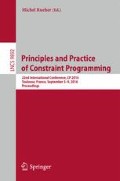Abstract
The resource-constrained project scheduling problem is a fundamental scheduling problem which comprises activities, scarce resources required by activities for their execution, and precedence relations between activities. The goal is to find an optimal schedule satisfying the resource and precedence constraints. These scheduling problems have many applications, ranging from production planning to project management. One of them concerns multi-modes of activities, in which each mode represents a different time-resource or resource-resource trade-off option. In recent years, constraint programming technologies with nogood learning have pushed the boundaries for exact solution methods on various resource-constrained scheduling problems, but, surprisingly, have not been applied on multi-mode resource-constrained project scheduling. In this paper, we investigate different constraint programming models and searches and show the superiority of such technologies in comparison to the current state of the art. Our best approach solved all remaining open instances from a well-established benchmark library.
Access this chapter
Tax calculation will be finalised at checkout
Purchases are for personal use only
References
Coelho, J., Vanhoucke, M.: The Multi-mode resource-constrained project scheduling problem. In: Schwindt, C., Zimmermann, J. (eds.) Handbook on Project Management and Scheduling. International Handbooks on Information Systems, vol. 1, pp. 491–511. Springer, Heidelberg (2015)
Feydy, T., Stuckey, P.J.: Lazy clause generation reengineered. In: Gent [3], pp. 352–366
Gent, I.P. (ed.): Principles and Practice of Constraint Programming - CP 2009. LNCS, vol. 5732. Springer, Heidelberg (2009)
Kreter, S., Schutt, A., Stuckey, P.J.: Modeling and solving project scheduling with calendars. In: Pesant, G. (ed.) CP 2015. LNCS, vol. 9255, pp. 262–278. Springer, Heidelberg (2015)
Mika, M., Waligóra, G., Wȩglarz, J.: Overview and state of the art. In: Schwindt, C., Zimmermann, J. (eds.) Handbook on Project Management and Scheduling. International Handbooks on Information Systems, vol. 1, pp. 445–490. Springer, Heidelberg (2015)
Nethercote, N., Stuckey, P.J., Becket, R., Brand, S., Duck, G.J., Tack, G.R.: MiniZinc: towards a standard CP modelling language. In: Bessière, C. (ed.) CP 2007. LNCS, vol. 4741, pp. 529–543. Springer, Heidelberg (2007)
Ohrimenko, O., Stuckey, P.J., Codish, M.: Propagation via lazy clause generation. Constraints 14(3), 357–391 (2009)
Schnell, A., Hartl, R.F.: On the efficient modeling and solution of the multi-mode resource-constrained project scheduling problem with generalized precedence relations. OR Spectrum 38(2), 283–303 (2015)
Schutt, A.: Improving scheduling by learning. Ph.D. thesis, The University of Melbourne (2011). http://hdl.handle.net/11343/36701
Schutt, A., Chu, G., Stuckey, P.J., Wallace, M.G.: Maximising the net present value for resource-constrained project scheduling. In: Beldiceanu, N., Jussien, N., Pinson, É. (eds.) CPAIOR 2012. LNCS, vol. 7298, pp. 362–378. Springer, Heidelberg (2012)
Schutt, A., Feydy, T., Stuckey, P.J.: Scheduling optional tasks with explanation. In: Schulte, C. (ed.) CP 2013. LNCS, vol. 8124, pp. 628–644. Springer, Heidelberg (2013)
Schutt, A., Feydy, T., Stuckey, P.J., Wallace, M.G.: Why cumulative decomposition is not as bad as it sounds. In: Gent [3], pp. 746–761
Schutt, A., Feydy, T., Stuckey, P.J., Wallace, M.G.: Explaining the cumulative propagator. Constraints 16(3), 250–282 (2011)
Schutt, A., Feydy, T., Stuckey, P.J., Wallace, M.G.: Solving RCPSP/max by lazy clause generation. J. Sched. 16(3), 273–289 (2012)
Schutt, A., Stuckey, P.J., Verden, A.R.: Optimal carpet cutting. In: Lee, J. (ed.) CP 2011. LNCS, vol. 6876, pp. 69–84. Springer, Heidelberg (2011)
Zhu, G., Bard, J.F., Yu, G.: A branch-and-cut procedure for the multimode resource-constrained project-scheduling problem. INFORMS J. Comput. 18(3), 377–390 (2006)
Author information
Authors and Affiliations
Corresponding author
Editor information
Editors and Affiliations
Rights and permissions
Copyright information
© 2016 Springer International Publishing Switzerland
About this paper
Cite this paper
Szeredi, R., Schutt, A. (2016). Modelling and Solving Multi-mode Resource-Constrained Project Scheduling. In: Rueher, M. (eds) Principles and Practice of Constraint Programming. CP 2016. Lecture Notes in Computer Science(), vol 9892. Springer, Cham. https://doi.org/10.1007/978-3-319-44953-1_31
Download citation
DOI: https://doi.org/10.1007/978-3-319-44953-1_31
Published:
Publisher Name: Springer, Cham
Print ISBN: 978-3-319-44952-4
Online ISBN: 978-3-319-44953-1
eBook Packages: Computer ScienceComputer Science (R0)

